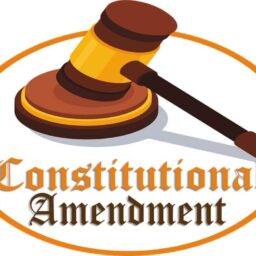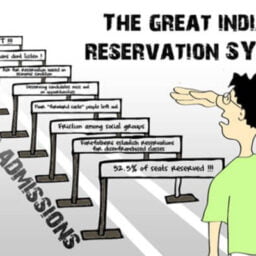INTRODUCTION
The Ministry of Social Justice and Empowerment has introduced The Constitution (One Hundred and Twenty-Seventh Amendment) Bill, 2021 in Lok Sabha. It is clarificatory in nature. The bill seeks to amend the constitution by adding few provisions that will restore the power of the states and UTs to make their list of socially and educationally backward classes (OBC list). The Bill has been passed in both houses of parliament without any opposition.
The Purpose of the bill is believed to empowering the states. The 127th Constitutional Amendment Bill, 2021 seeks to restore the power of the states to identify OBCs that are socially and economically backward after an SC order in May 2021 which gave this exclusive right to the central Government.
A WELCOMING MOVE
The amendment was thought necessary after the Supreme Court judgement that upheld the 102nd Constitutional Amendment Act in the Maratha Reservation case, which said the president of India in consultation with Governors would specify socially and educationally backward classes by taking away the powers of the state government to do so. Several parties also demanded a caste-based census to get a real idea of the number of OBCs in the country and to remove the 50% cap on reservations currently in place.
SPECIFICS OF 102ND CONSTITUTION AMENDMENT ACT
This act inserted the following articles and sub-clauses:-
- Article 338B– It dealt with the structure, power and duties of the National Commission for Backward Classes (NCBC).
- Article 342A– It provided the President with the power to add a particular caste into the SEBC list and provided a procedure to change the list by the parliament.
- Article 366 (26C) – It defined SEBCs.
- National Commission for Backward Classes (NCBC) was given constitutional status by this Amendment Act. It was established in 1993 by an act of Parliament and its directive was to examine complaints regarding the inclusion or non-inclusion of any caste in the OBC list at the central level.
WHY SC INTERVENED IN THIS MATTER?
In 2018, the Maharashtra government passed the Maharashtra State Reservation for Socially and Educationally Backward Classes (SEBC) Act, 2018. The bill was passed based on the Gaikwad panel findings and it provided 16% reservation in education and govt. jobs to the Maratha community. The quota was challenged in Bombay High Court as it violated the earlier SC order in the Indira Sawhney case (1992). Later, in December 2018, HC refused the demand for an interim stay on the quota while the proceeding continues. Finally, in June 2019, the High Court upheld the quota and instructed the Maharashtra government to reduce the quota to 12-13% instead of 16% as per the recommendation of the State Backward Class Commission. The court also said that the “ceiling imposed by the Supreme Court could be exceeded in exceptional circumstances”
However, In Jaishri Laxmanrao Patil v. The Chief Minister And Ors. (2021) also known as the ‘Maratha Reservation case’, the Constitution Bench of the SC struck down the Maratha reservation Law as it exceeded the permitted limit. The court gave its verdict and said:-
“We have found that no extraordinary circumstances were made out in granting separate reservation of Maratha Community by exceeding the 50 per cent ceiling limit of reservation. The Act, 2018 violates the principle of equality as enshrined in Article 16. The exceeding of ceiling limit without there being any exceptional circumstances violates Articles 14 and 16 of the Constitution which makes the enactment ultra vires,”
The Judgement also took away the power of the state to identify and notify to SEBCs for the grant of quota in the Other Backward Classes list (OBCs). Also, the court held that from now on the president will determine which communities will be included in the state OBC list as per the recommendation of the National Commission for Backword Class (NCBC). The Court denied any changes in the SC/ST reservation.
WHAT’S THE NEED?
The reason behind this amendment bill has been to override/counter the latest SC judgement in the Maratha Case which took away the state governments power to maintain a state list of OBCs. This interpretation might have a devastating consequence as it gives the central government exclusive rights regarding the inclusion and exclusion of any caste or community from the list of OBCs. If the state government loses its power to make and maintain the state list then around 671 OBC communities (1/5 of total OBC communities) might lose their reservation in appointments and educational institutions throughout the country.
“In the task of identification of SEBCs, the President shall be guided by the Commission set up under Article 338B; its advice shall also be sought by the state regarding policies that might be framed by it. If the commission prepares a report concerning matters of identification, such a report has to be shared with the state government, which is bound to deal with it, in accordance with provisions of Article 338B. However, the final determination culminates in the exercise undertaken by the President (i.e. the Central Government, under Article 342A (1), by reason of Article 367 read with Section 3 (8) (b) General Clauses Act).”
This bill also promotes social empowerment by guaranteeing dignity, opportunity and justice to the relegated sections/communities of the societies. While some people believe that the notion of social justice remains stagnant unless- “backward and oppressed castes don’t get proportional representation in all pillars of the democracy”.
- Apart from Maharashtra, the quota ceiling has been breached by Haryana, Chhattisgarh and Tamil Nadu. While different states have requested the SC to increase the quota ceiling. Also, the apex court has rejected the centre’s plea on reviewing its verdict in Maratha Case.
WHAT CHANGES CAN WE EXPECT?
- The 127th Constitutional Amendment Bill will amend Article 342A by inserting a new clause 3 and amending Clause 1 & 2. Relevantly, Clause 3 mentions the “state list” which would be removed from the domain of the president and the changes to the list will be made by the state assembly.
- There will be some changes in Article 366 (26C) and 338B (9). Hence, the state government will again be able to make the OBC list in the same way as it used to before the Supreme Court judgement.
- Now, the states will be able to deal with SEBCs without any interference from NCBC. If the President gives his assent to the bill then it will be known as the 105th Constitutional Amendment Act, 2021
A LONG WAY TO GO
The reason behind the support of this amendment bill by the opposition has been political. Although, India is a developing country and has come a long way since its independence. Most of the decision taken in this country is based on the political angle. The bill was a ‘political landmine’ and that’s why it was passed without any opposition. None of the political parties wanted to lose their support from the OBC community, especially this close to the election in UP. We need to have a change in this ideology. The decision to pass legislation should be for the benefit of its citizen and the development of the country rather than gaining or losing votes.
CONCLUSION
The Amendment bill is historic as it is going to have a direct effect on 671 communities of the country. The bill was passed unanimously which shows the dedication and commitment to the development of the minority class. And restoring the state right to make its OBC list will give the states their autonomy back. The states are better suited in identifying and helping in the advancement of the community. They are quick to respond to the requirement of any particular caste or community or the native population of the region. This bill is going to improve the centre-state relation and boost the federal feature of our country. This amendment is crucial and has a large impact on the benefit of society at large.
Author(s) Name: Arun Shekhar Jawla (Chandigarh University, Punjab)















